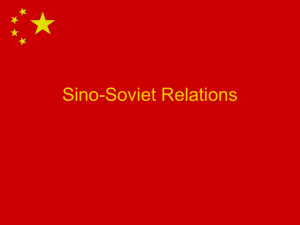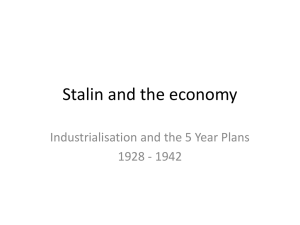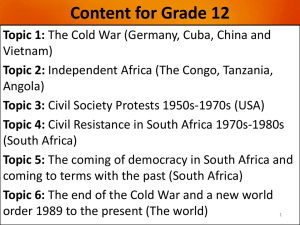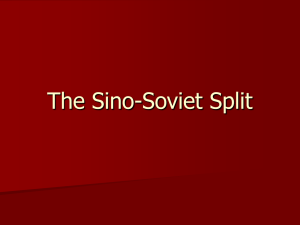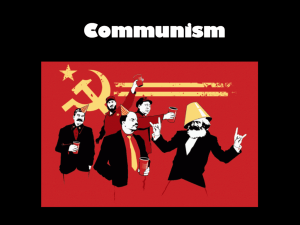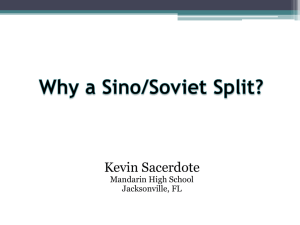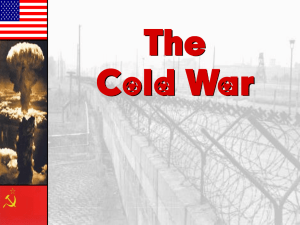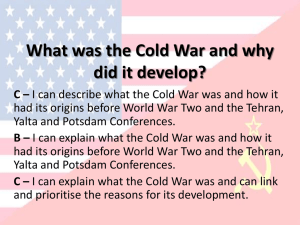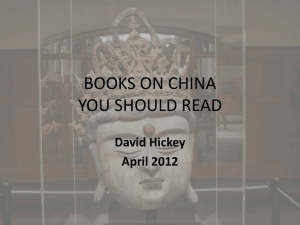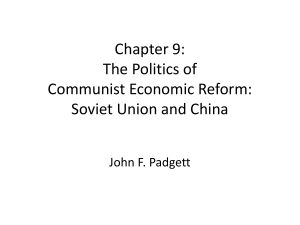File - Beechen Cliff School Humanities Faculty
advertisement
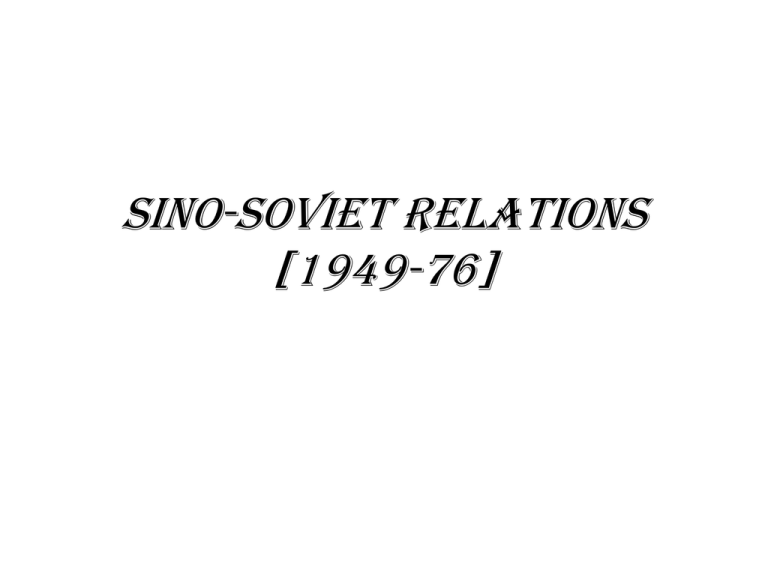
Sino-soviet relations [1949-76] TIMELINE 1950 Treaty of Friendship, Alliance and Mutual Assistance 1953 Stalin’s death 1956 Twentieth Congress (Khrushchev’s speech – Destalinisation) 1958 Great Leap Forward 1958 USSR cancels Sino-Sov agreement on atomic cooperation 1960 USSR pulls out all economic aid and advisers from China 1964 Khrushchev dismissed as Soviet leader China explodes its first nuclear bomb 1965 USSR strengthens its ties with Mongolia, North Korea & North Vietnam attempt to isolate China in international affairs in 1968 Cultural Revolution 1969 Ussuri River dispute 1970 Soviet Prime Minister visits China, relations improve slightly 1971 Kissinger, US Secretary of State, visits China. Chinese relations with deteriorate USSR OVERVIEW - Relationship between Stalin and Mao had never been an easy one - It began as one of friendship and alliance but growing tensions caused it to deteriorate - Impacted on US foreign policy - As Chinese/Russian relations deteriorated, Chinese/American relations improved 1950 TREATY OF FRIENDSHIP, ALLIANCE AND MUTUAL ASSISTANCE formal alliance between China and Russia, of which China was treated as the junior partner terms were heavily favourable to the USSR; reflection of the relationship at the time inequality of the alliance was demonstrated to China in the Korean War & Taiwan Straits Crisis 1950-3 KOREAN WAR Stalin pushed for military intervention Ultimately Soviets had last word on strategy but China bore the brunt of the casualties Chinese sense of inequality and superiority 1954-5 TAIWAN STRAITS CRISES CPP seized mainland China, forced out GMD who fled to Taiwan and surrounding islands Mao wanted control of islands to shelled Quemoy to highlight issue and cement USSR alliance GMD were supported by US and the conflict subsided until 1958 when Mao began shelling Quemoy again to highlight threat of USA in attempt to tie USSR to the defence of China USSR had serious misgivings over Chinese tactics BACKGROUND Tensions had long existed but the Treaty of Friendship, Alliance and Mutual Assistance cemented the Sino-Soviet relationship between 1949 and 1956. However, verbal attacks and failure to cooperate built up and led to more serious problems in the 1960’s; 1967 Chinese Red Guards attack Russian Embassy in Beijing China encouraged communist Albania & Romania to assert greater independence from Moscow China competed with USSR in supporting comm. groups in developing world; rival comm. terrorist groups By 1969, border disputes had developed into an armed battle at the Ussuri River The causes of the Sino-Soviet split are a mix of ideological differences and national interests… Ideological differences • Disputes arose over the best way to pursue communist revolution; the Chinese communist party had adapted communism to a rural-based society and was accustomed to making its own decisions. Soviet leadership had used Comintern and later Cominform to exercise control over other communist countries, however these organisations were not enough to prevent the Chinese criticising the soviet union. Mao considered himself the junior Stalin and therefore following Stalin’s death in 1953, Mao felt himself senior to Khrushchev. Mao disliked the new Soviet leader’s policies; • Khrushchev pursued a policy of reconciliation with Tito, whom had been unwilling to impose Stalin’s policies in 1948 which Mao regarded as ideological revisionism. • Mao was heavily critical of Khrushchev’s pursuit of “peaceful coexistence” as he believed it was showing weakness against capitalism. This criticism was heightened when Khrushchev visited America in 1959. • Khrushchev speech at the Twentieth Party Congress of February 1956 made various criticisms of Stalin’s policies, presenting the message that Stalin’s application of ideology contained errors and must be changed. As Mao’s domestic policies were based on Stalin’s he was greatly offended by “De-Stalinisation.” • Khrushchev had been critical of the “Great Leap Forward” particularly the steel furnaces. • Khrushchev also criticised Mao for splitting the communist movement and therefore helping capitalists. National interests • • • • Arguments arose over the USSR’s refusal to reduce its ties to Mongolia which China considered to be within its own sphere of influence. The USSR constantly blocked China’s request to expand its control in North Korea. Boarder disputes between China and Russia had a long history that the communist regimes of both countries could not ignore. The Soviet union had multiple army divisions stationed along the Chinese boarder, the amount had doubled in 1970. The Soviet invasion of Czechoslovakia in 1968 affected Chinese perceptions of the USSR; Czechoslovakia had been invaded to bring about a more independent communist government and the Chinese understood the message that the USSR could use these actions elsewhere. Ussuri River Dispute 1969 • • • • • Arguments over the exact position of the Sino-Soviet boarder had been long standing and had often been sources of tension between Russia and Imperial China. What made the issue of laying down borders along the Ussuri River difficult was the geographical condition of the area. In 1964 a preliminary agreement had been reached by which the USSR was prepared to hand over Damansky Island to China, however when Mao spoke openly about this being the first of many Chinese territorial gains from the USSR; Khrushchev was outraged and cancelled the agreement. As the invasion of Czechoslovakia 1968 produced a real fear of invasion in China, the Chinese military developed a strategy of ‘active defence’ – a pre-emptive strike against USSR in which Chinese were at an advantage. • Consequences; • Damansky island remained with the Soviets. • Boarder dispute was left unresolved. Tensions increased along the boarder, August 1969 a serious clash occurred between troops. Dispute seems to have key significance in persuading Mao that China’s foreign policy needed to be re appraised. The result was a changed approach to the USA which would foreshadow a profound impact on the Cold War and shatter the bipolarity that had existed since 1945. Chinese & American rapprochement Why? - Key consequence of Sino-Sov split - In China’s interest to seek rapprochement with their enemy - Mao sought to strengthen his position as leader of China and movement for world rev - USA now considered to be a declining power and the USSR to be a strong threat to China WHAT? -1971; American table tennis team invited to China (ping-pong diplomacy) -Trade and travel restrictions relaxed - July ’71; Kissinger, US Secretary of State, visited China and developed good working relationship with Enlai - 1972; Nixon visited China; success; communiqué produced at end of summit - 1975; Ford, new US President, visited China - Chinese gov. visited countries in Eastern Europe to strengthen ties with China at expense of USR - Trade between USA & China grew; from $5m to $500m in a year - US issued “Two China’s” policy & support for Taiwan diminished; backed expulsion of Taiwan from UN in 1971 and gave diplomatic recognition to comm. Regime in China, withdrew it from Taiwan - improved links with USA caused tensions with China & its allies; North Vietnam irritated as USA on defensive in the war, Albania accused China of betraying world proletarian revolution - links with USA helped restore Mao’s damaged standing with China after Cultural Rev; enhanced power of Enlai - for USA, links were valuable way of exerting pressure of USSR to extract concessions from them Consequences - completely changed national diplomacy and the balance of power - dented the idea of a communist bloc acting as one - forced USSR to change their thinking in international relations; world now seen in multi-polar terms - triangular diplomacy; more complex - Chinese support for Soviet position in international affairs could no longer be guaranteed - weakened Soviet position; in part responsible for bringing Soviet Union to negotiation table to make concessions - Nixon’s visit to China in 1972 made USSR more amenable to US wishes - all fed into pressures that promoted Détente and that produced agreements on trade, arms limitations and human rights Potential questions 1. 2. 3. CAUSES OF SINO-SOV SPLIT IMPACT OF RAPPROCHEMENT WITH USA & CHINA; IMPACT ON USSR IMPACT OF SINO-SOV SPLIT ON COLD WAR - How far was the Sino-Soviet split of the late 1960s the result of ideological differences between the two communist powers?
